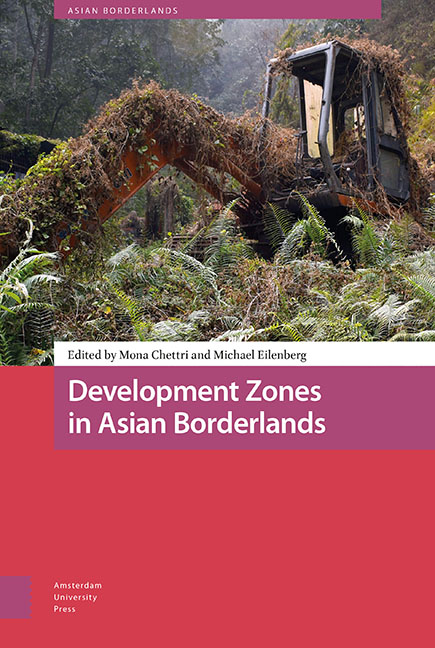Book contents
- Frontmatter
- Contents
- List of Figures and Tables
- Acknowledgements
- Introduction: Enclave Development and Socio-spatial Transformations in Asian Borderlands
- 1 Post-disaster Development Zones and Dry Ports as Geopolitical Infrastructures in Nepal
- 2 Onwards and Upwards: Aerial Development Zones in Nepal
- 3 Casinos as Special Zones: Speculative Development on the Nation’s Edge
- 4 Thinking the Zone: Development, Climate, and Heterodystopia
- 5 From Shangri-La to De facto SEZ: Land Grabs from “Below” in Sikkim, India
- 6 Development Zones in Conflict-Affected Borderlands: The Case of Muse, Northern Shan State, Myanmar
- 7 Smart Enclaves in the Borderland: Digital Obligations in Northeast India
- 8 Post-Disaster Economies at the Margins: Development, Profit, and Insecurities Across Nepal’s Northern Borderlands
- 9 Development from the Margins: Failing Zones and Suspended Development in an Indonesian Border Village
- 10 From Boom to Bust – to Boom Again?: Infrastructural Suspension and the Making of a Development Zone at the China-Laos Borderlands
- 11 Genealogies of Extraction: De Facto Development Zones in the Indonesian Borderlands
- Notes on Contributors
- Index
9 - Development from the Margins: Failing Zones and Suspended Development in an Indonesian Border Village
Published online by Cambridge University Press: 18 June 2021
- Frontmatter
- Contents
- List of Figures and Tables
- Acknowledgements
- Introduction: Enclave Development and Socio-spatial Transformations in Asian Borderlands
- 1 Post-disaster Development Zones and Dry Ports as Geopolitical Infrastructures in Nepal
- 2 Onwards and Upwards: Aerial Development Zones in Nepal
- 3 Casinos as Special Zones: Speculative Development on the Nation’s Edge
- 4 Thinking the Zone: Development, Climate, and Heterodystopia
- 5 From Shangri-La to De facto SEZ: Land Grabs from “Below” in Sikkim, India
- 6 Development Zones in Conflict-Affected Borderlands: The Case of Muse, Northern Shan State, Myanmar
- 7 Smart Enclaves in the Borderland: Digital Obligations in Northeast India
- 8 Post-Disaster Economies at the Margins: Development, Profit, and Insecurities Across Nepal’s Northern Borderlands
- 9 Development from the Margins: Failing Zones and Suspended Development in an Indonesian Border Village
- 10 From Boom to Bust – to Boom Again?: Infrastructural Suspension and the Making of a Development Zone at the China-Laos Borderlands
- 11 Genealogies of Extraction: De Facto Development Zones in the Indonesian Borderlands
- Notes on Contributors
- Index
Summary
Abstract
This paper argues that the moulding of the promise of development zones with existing local aspirations for the future generates a powerful affective force that potentially incites social transformation. The paper demonstrates this argument by examining suspended development in an Indonesian border village, Long Nawang, which is designated by the state as a prospective border economic centre. The paper highlights how the promise of accelerated development intensifies existing aspirations for urbanity among border elites and villagers. The aspiration persists among the elites even when development zones do not materialise as intended due to delays in key development milestones in Long Nawang. The paper illustrates this persistence by looking at how the elites use their authority to fashion the villagers into tame development subjects in a vague bid to keep the potential urbanised future alive.
Keywords: suspension, development, hope, potentiality, future-making, Borneo, Indonesia
Introduction
In recent years, Asian borderlands are often seen as spaces pregnant with extractive and productive potential and have become prime targets for intensified and accelerated development (Cons and Eilenberg 2019). Thus, the contemporary proliferation of development zones across Asian borderlands is relevant to this edited volume. In this chapter, I refer to development zones mainly as a mobile state technology imbued with promises of optimisation, productivity, and accelerated development in economically underutilised spatial milieus such as marginal borderlands. As these development zones proliferate in delineated borderland locations, their promises become appropriable. That is, the development zones interact with existing, or catalyse new, aspirations for the future in the populations living within them. In this chapter, I seek to foreground the impact of the promises that emerge within a development zone that may potentially incite social transformation.
The ubiquity of development zone proliferation in Asian borderlands subjects these areas to a high potential for drastic social transformation. In contemporary Asia, the famous Belt and Road Initiative (BRI) is perhaps the prime example of such transformation. The Chinese project embodies an ambitious dream of transcontinental economic integration while simultaneously modernising its underdeveloped western border area (Rippa 2017, 3). BRI, however, is not the only high-modern fantasy of increased economic productivity that is changing the face of Asian borderlands. Largely unaffected by the BRI, development zones also proliferate in terrestrial borderlands in Southeast Asia as a consequence of the Indonesian state’s recent pro-border development policy.
- Type
- Chapter
- Information
- Development Zones in Asian Borderlands , pp. 211 - 230Publisher: Amsterdam University PressPrint publication year: 2021



